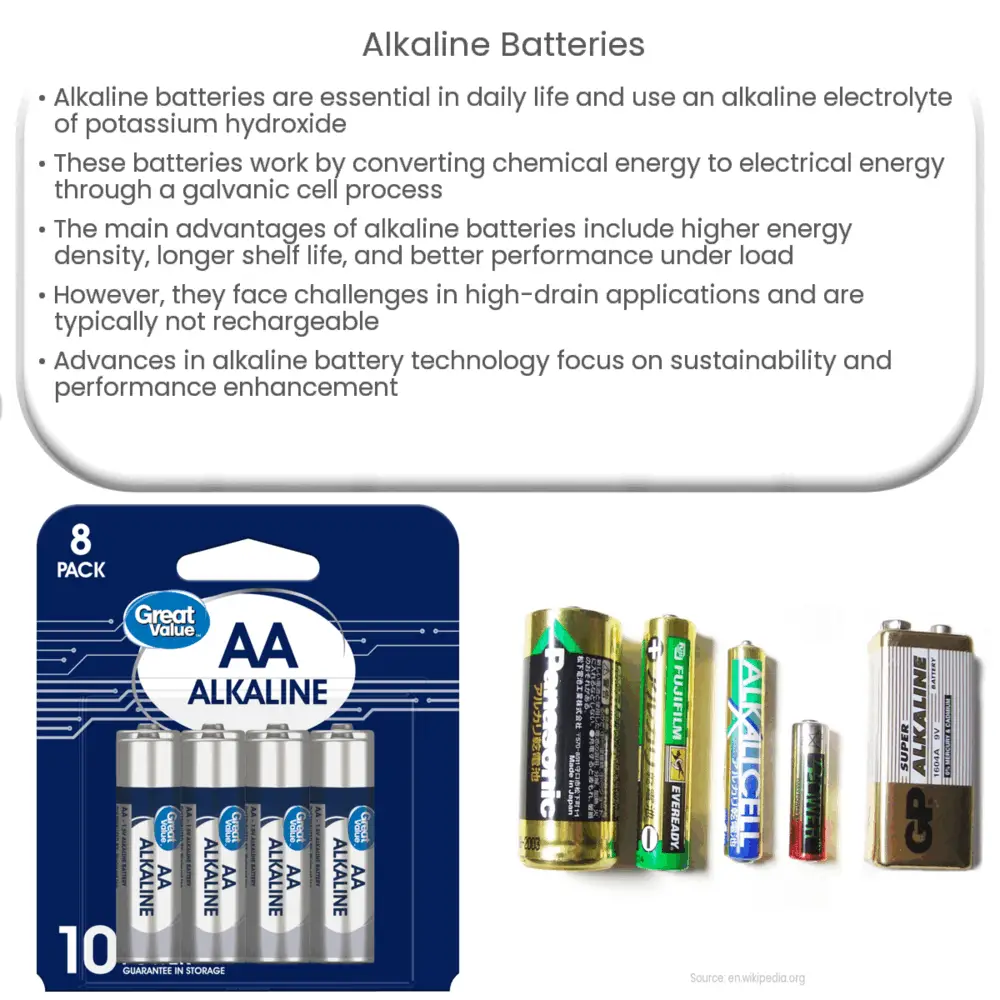Explore the workings of alkaline batteries, their advantages, limitations, and future trends in our comprehensive guide.

Introduction to Alkaline Batteries
Alkaline batteries, an essential component in our everyday lives, have been powering our devices for many decades. They owe their name to the alkaline electrolyte of potassium hydroxide used in their construction, as opposed to the acidic electrolyte found in earlier battery types.
How Alkaline Batteries Work
Understanding how these powerhouses work is key to appreciating their role in modern society. At the core, an alkaline battery is a galvanic cell, converting stored chemical energy into electrical energy. The cell consists of a negative electrode (anode), a positive electrode (cathode), and an electrolyte that facilitates the chemical reaction between these electrodes.
- Anode: The anode is typically made of zinc powder, which increases its surface area, allowing a greater reaction rate and thus, more power.
- Cathode: The cathode is composed of manganese dioxide.
- Electrolyte: Potassium hydroxide acts as the alkaline electrolyte.
When the battery is connected to a device, a chemical reaction occurs. The zinc at the anode oxidizes to form zinc ions (Zn2+), releasing electrons. These electrons then travel through the device, powering it, and end up at the cathode where they are taken up by the manganese dioxide, reducing it. The process can be summarized as follows:
- Zinc at the anode undergoes oxidation: Zn → Zn2+ + 2e–
- Manganese dioxide at the cathode undergoes reduction: MnO2 + H2O + e– → MnOOH + OH–
Advantages of Alkaline Batteries
There are numerous reasons why alkaline batteries have become so prevalent. Primarily, they offer a higher energy density and longer shelf life compared to their acidic counterparts. Additionally, they perform better under load, making them suitable for more power-hungry devices, and have better leakage resistance, enhancing their safety and reliability.
Despite these advantages, like all power sources, alkaline batteries are not without their limitations. In the following section, we will delve into some of the challenges and issues associated with these batteries, as well as emerging trends in their design and application.
Limitations and Challenges of Alkaline Batteries
While alkaline batteries offer many advantages, there are limitations to their effectiveness. They struggle to maintain their performance under high-drain applications or continuous use, which can result in a significant decrease in the battery’s lifespan. Furthermore, they are not typically rechargeable. While some types of rechargeable alkaline batteries do exist, they are not as common as other rechargeable types, such as lithium-ion or nickel-metal hydride.
Trends in Alkaline Battery Technology
The world of alkaline batteries is not static and continues to evolve, driven by advancements in technology and the demands of an ever-changing market. One trend is the development of more sustainable and eco-friendly batteries. This is in response to growing environmental concerns regarding the disposal of used batteries, which can leach harmful chemicals into the soil and water if not properly disposed of.
Furthermore, the rising interest in renewable energy sources and the demand for efficient storage systems is pushing the boundaries of alkaline battery technology. Recent advancements include improvements in design for better performance and longevity, as well as the development of rechargeable alkaline batteries.
Conclusion
In conclusion, alkaline batteries are a testament to human ingenuity and our ability to harness the power of chemical reactions for our benefit. Despite the challenges and limitations associated with their use, they continue to play a critical role in powering the devices that are integral to our everyday lives. The ongoing advancements in battery technology promise a future where these energy storage devices are more efficient, sustainable, and versatile. As we move towards an increasingly digital world, the importance of reliable and efficient energy storage, like that offered by alkaline batteries, cannot be overstated.

